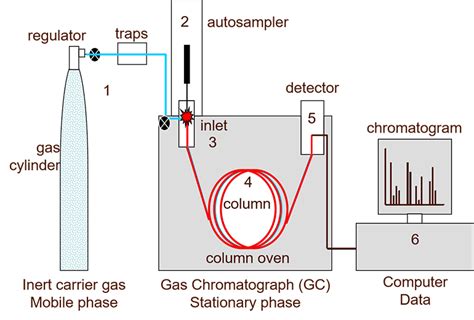The importance of gas chromatography (GC) cannot be overstated, as it has revolutionized the way various industries analyze and identify the components of mixtures. From pharmaceuticals to environmental monitoring, GC has become an essential tool in ensuring the quality, safety, and efficacy of products and processes. In this article, we will explore the six ways gas chromatography impacts various industries and how it has become an indispensable technique in modern analytical chemistry.
Pharmaceutical Industry

In the pharmaceutical industry, gas chromatography plays a critical role in the development, production, and quality control of drugs. GC is used to analyze the purity and potency of active pharmaceutical ingredients (APIs), detect impurities, and identify degradation products. This helps ensure that pharmaceuticals are safe and effective for human consumption.
Impurity Profiling
One of the key applications of GC in the pharmaceutical industry is impurity profiling. GC is used to detect and quantify impurities in APIs, which is essential for ensuring the safety and efficacy of pharmaceuticals. Impurities can arise from various sources, including raw materials, manufacturing processes, and degradation reactions. GC helps identify and quantify these impurities, enabling pharmaceutical manufacturers to optimize their production processes and ensure compliance with regulatory requirements.
Environmental Monitoring

Gas chromatography is widely used in environmental monitoring to analyze air, water, and soil samples for pollutants and contaminants. GC is used to detect and quantify volatile organic compounds (VOCs), polycyclic aromatic hydrocarbons (PAHs), and other pollutants that can harm human health and the environment. This helps regulatory agencies and environmental organizations monitor pollution levels, identify sources of pollution, and develop strategies to mitigate environmental damage.
Identification of Unknown Compounds
GC is particularly useful in environmental monitoring for identifying unknown compounds in samples. This is achieved through the use of mass spectrometry (MS) detectors, which provide detailed information on the molecular structure of compounds. By analyzing the MS data, researchers can identify unknown compounds and develop strategies to mitigate their impact on the environment.
Food and Beverage Industry

In the food and beverage industry, gas chromatography is used to analyze the composition of food products, detect contaminants, and ensure compliance with food safety regulations. GC is used to analyze the fatty acid composition of oils, detect pesticides and herbicides in fruits and vegetables, and identify flavor compounds in beverages.
Authentication of Food Products
GC is used to authenticate food products, such as olive oil, honey, and spices. By analyzing the fatty acid composition or volatile compounds in these products, researchers can identify their origin, quality, and authenticity. This helps prevent food adulteration and ensures that consumers receive high-quality products.
Petrochemical Industry

In the petrochemical industry, gas chromatography is used to analyze the composition of petroleum products, such as gasoline, diesel fuel, and lubricants. GC is used to detect and quantify impurities, such as sulfur and nitrogen compounds, which can affect the quality and performance of petroleum products.
Optimization of Refining Processes
GC is used to optimize refining processes in the petrochemical industry. By analyzing the composition of petroleum products, researchers can identify areas for improvement in the refining process, such as the removal of impurities and the optimization of catalytic reactions.
Cosmetics and Personal Care Industry

In the cosmetics and personal care industry, gas chromatography is used to analyze the composition of skincare products, such as creams, lotions, and fragrances. GC is used to detect and quantify ingredients, such as moisturizers, emollients, and preservatives, which can affect the quality and safety of skincare products.
Stability Testing
GC is used to perform stability testing on skincare products, which involves analyzing the composition of products over time to ensure that they remain stable and effective. This helps manufacturers ensure that their products meet regulatory requirements and consumer expectations.
Forensic Science

In forensic science, gas chromatography is used to analyze evidence, such as blood, hair, and tissue samples, to help solve crimes. GC is used to detect and quantify substances, such as drugs, poisons, and explosives, which can be used to reconstruct crimes and identify suspects.
Analysis of Ignitable Liquids
GC is used to analyze ignitable liquids, such as gasoline and lighter fluid, which are often used in arson attacks. By analyzing the composition of these liquids, researchers can identify their origin and link them to specific crimes.





In conclusion, gas chromatography has a significant impact on various industries, including pharmaceuticals, environmental monitoring, food and beverage, petrochemicals, cosmetics, and forensic science. Its applications range from impurity profiling and identification of unknown compounds to optimization of refining processes and stability testing. As technology continues to evolve, we can expect to see even more innovative applications of gas chromatography in the future.
What is gas chromatography?
+Gas chromatography is an analytical technique used to separate, identify, and quantify the components of mixtures.
What are the applications of gas chromatography?
+Gas chromatography has a wide range of applications, including pharmaceuticals, environmental monitoring, food and beverage, petrochemicals, cosmetics, and forensic science.
What is the principle of gas chromatography?
+Gas chromatography is based on the principle of partition chromatography, where a mixture of compounds is separated into its individual components based on their boiling points and affinity for a stationary phase.
